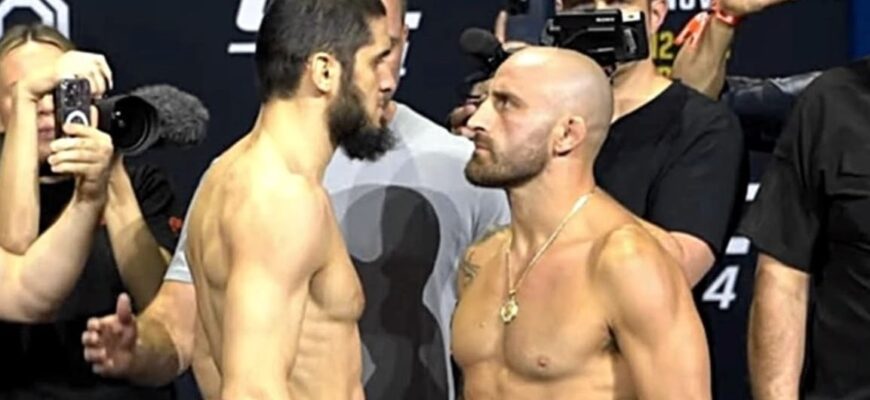In the unforgiving world of mixed martial arts, where physical prowess and unwavering mental fortitude are prerequisites for success, even the most decorated champions face a unique set of challenges. Alexander Volkanovski, a name synonymous with dominance in the featherweight division, recently offered a candid look behind the curtain, revealing the hidden costs of his relentless drive and the profound impact of unseen injuries.
The Unseen Blow: Makhachev`s Lingering Impact
For over a decade, Alexander “The Great” Volkanovski was an unstoppable force at 145 pounds, a champion who defended his UFC featherweight title five times with an almost surgical precision. His reign was a testament to his skill, resilience, and tactical genius. However, the narrative of his career took a dramatic turn with two high-profile losses, particularly the knockout suffered against Ilia Topuria in February 2024, which ended his celebrated tenure as champion.
While the Topuria knockout was undeniably devastating to witness, Volkanovski now reveals a more insidious truth: the concussion he sustained four months prior, during his short-notice lightweight title challenge against Islam Makhachev, was, in his own words, *worse*. This revelation isn`t about diminishing Topuria`s impressive victory, but rather shedding light on the subtle yet profound consequences of brain trauma that often elude the casual observer.
“I had a decent concussion from Islam… I feel like I had more of a concussion from the Islam one. Even though I was knocked out longer with Ilia, I had a lot more of the symptoms with the Islam one.”
This statement offers a crucial distinction. Being “knocked out longer” is a stark visual indicator of trauma, yet the lingering symptoms – the headaches, the cognitive fogginess, the training impediments – can be far more debilitating and long-lasting. It’s a sobering reminder that the visible drama of a knockout punch only tells part of the story; the true battle often continues long after the lights come back on.
The Champion`s Folly: Rushing Back to Battle
The original report suggests that questions arose about Volkanovski`s expedited return to the octagon after the Makhachev bout. His confession confirms these concerns were well-founded. Despite experiencing significant post-concussion symptoms, the champion`s ingrained warrior mentality, coupled with the immense pressure and allure of championship gold, propelled him towards an ill-advised quick turnaround.
Volkanovski openly admits to a degree of self-deception, a common psychological hurdle for elite athletes who operate under the belief of their own invincibility. He convinced himself that an immediate return, even with compromised recovery, would somehow make him “more dangerous.” It`s a testament to the iron will that makes champions, but also a stark warning about how that same will can, paradoxically, lead to self-sabotage.
“I`m telling you, I went in there [ahead of the Makhachev rematch] going I`m going to be more dangerous now because I`m at 11 days. I literally told myself that… I`m literally like, `This is the most dangerous you`ve seen me.` I`m not beating him by decision, I have to go, I`m going to have to be more aggressive, I`m going to take more risks, and I literally believed it.”
This candid reflection highlights a fascinating paradox: the unwavering belief that drives athletes to greatness can also blind them to their own vulnerabilities. His desire to prove himself, to overcome adversity through sheer force of will, led him to dismiss crucial medical advice and personal well-being. Even when friends and advisors cautioned him, the reply was a defiant, “Bullshit. No. No. I ain`t having it.”
Lessons Learned, The Hard Way
Volkanovski`s story serves as a critical case study in the intersection of athletic ambition and neurological health. It underscores the vital importance of proper recovery, especially from brain injuries, in high-impact sports. While the desire to compete is admirable, the long-term consequences of neglecting recovery can be severe, not just for a fighter`s career, but for their overall quality of life.
His recent victory against Diego Lopes, reclaiming a vacant featherweight belt, proves that his competitive fire still burns bright. However, one can only hope that this hard-learned lesson in humility and self-preservation will guide his future decisions. The octagon demands everything from its gladiators, but true wisdom often lies in knowing when to step back, heal, and fight another day, rather than risking it all for a perceived advantage.
Alexander Volkanovski`s honesty is a powerful contribution to the ongoing conversation about fighter safety and the often-invisible toll of combat sports. It`s a stark reminder that even the most formidable warriors are, at their core, human, subject to the same physical limitations and the profound need for careful, considered recovery. Perhaps his experience will serve as a valuable cautionary tale, encouraging a greater emphasis on long-term health over immediate gratification in the relentless pursuit of glory.








